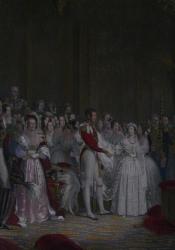Marriage Causes Act of 1857 is Passed
This timeline submission will respond to discussions in class questioning why Mr Rochester could not have divorced his wife after finding out that she was insane and a danger to herself and others in Charlotte Brontë’s Jane Eyre. I will go into detail about the social implications that such an action would have for someone of Rochester’s status and explore how it would be different for a person in a lower social or economic class. I will also examine the process that Rochester would have undertaken had he made the decision to divorce Bertha Mason to perhaps provide a literary analysis on Rochester’s apparent hierarchy of values regarding social status and his relationship with Jane Eyre.
In an article specifically addressing Charles Dickens’s Middlemarch (although I am sure the arguments still apply to Brontë’s writing), Margaret Wood says that “[a]t the time the novel is set, English law held that when a woman was married, she became, in a sense, her husband’s property;” thus, for a wife, divorce was nearly impossible until 1857 according to the UK Parliament (Wood, UK Parliament). Until that time, when the Matrimonial Causes Act of 1857, a woman could only divorce her husband with sufficient grounds for suspecting adultery and only if “the adultery was compounded by life-threatening cruelty,” (UK Parliament). Additionally, initiating a divorce granted by Parliament which costed a small fortune, so only the very wealthy could afford a divorce even if there were grounds for legal divorce. Between the year 1700 and 1857, only three hundred and fourteen divorces were passed in Parliament, most of which were initiated by husbands (UK Parliament). In 1857, the Matrimonial Causes Act passed which transferred the duty of holding divorce hearings from Parliament to a special court; however, “the grounds for divorce remained substantially the same,” (UK Parliament).
Unfortunately, at the time of Jane Eyre’s publication, that bill would not be passed for another ten years.
But it seems apparent that Rochester certainly had the money to initiate divorce, and the text is clear that he had had mistresses since his union with Bertha Mason; what then halted his ability to divorce his wife?
In her article that discusses the social implications of marriage in Victorian England, Hannah Maiorana, Associate at Hill Education, supports a claim that “Victorian ideals saw the institution of marriage as the epitome of civilization,” upon which humanity stands as a divine separation from animalistic savagery (Maiorana). Rochester’s divorce, if he had proceeded with it, would have been destructive to the name of his family which he alone carries since the deaths of both his father and his older brother who left the estate and name to him. It is interesting to me that in the novel, divorce is not mentioned by either Jane or Rochester as an option perhaps hinting at the universal acceptance of the sanctity of marriage in the Victorian Era. Because divorce proceedings had to be held through Parliament, it would have been very public and destructive to the Rochester name.
As they say, blood is thicker than water, and the ever-respectful Jane would never allow Rochester to ruin his family name even for the sake of what both would consider ultimate happiness and fulfillment in their lives together.
Works Cited
Brontë, Charlotte. Jane Eyre. Vol. 1. New York: Vintage Books, 1847. 3 vols. Paperback.
Maiorana, Hannah. "Women of Divorce in High Society." 24 November 2017. Molly Brown House Museum. Web Page. 20 September 2021.
UK Parliament. "UK Parliament." 2021. Obtaining a Divorce. Web Page. 20 September 2021.
Wood, Margaret. "Marriage and Divorce 19th Century Style." 23 February 2018. Library of Congress. Blog Post. 20 September 2021.

